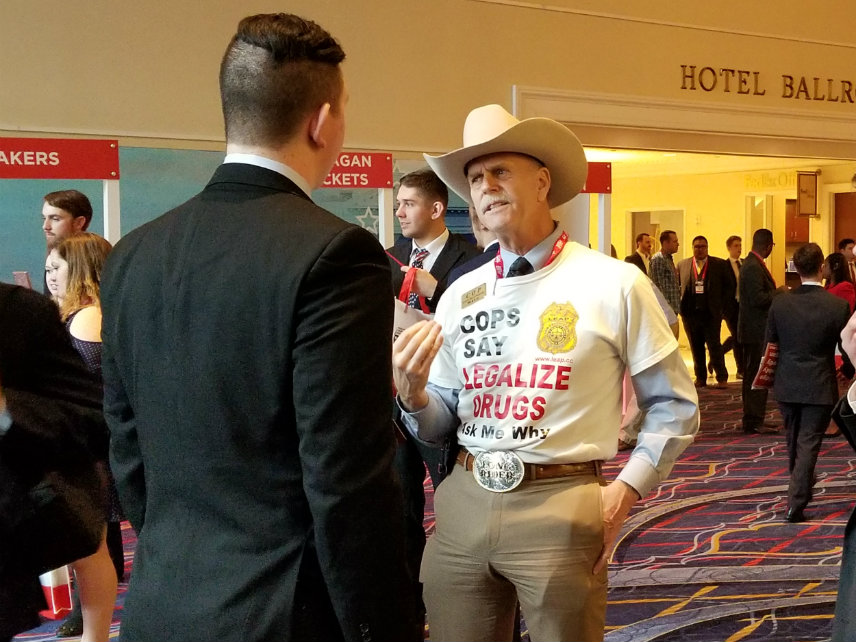At CPAC, a Pitch to End the Drug War: 'It's a Parkland, Florida, Every Two Days'
There's little discussion of the war on drugs at the Conservative Political Action Conference. Howard Wooldridge wants to change that.

At the top of the escalators in the massive foyer of the Gaylord Hotel and Convention Center, Howard Wooldrige is fighting to break the traditional link between conservatives, law enforcement, and the war on drugs. It's an uphill battle.
At the moment, he's debating a youngish attendee of the Conservative Political Action Conference (CPAC), who argues that the government has a role to play in preventing people from making poor life choices. Drugs ruin lives, the young man argues, and lives lost to drug use never blossom to their fullest potential, robbing society of what those individuals might have achieved. Wooldridge parries. If that's true, he says, then locking drug users in prison is robbing us of what they might have accomplished too.
Wooldridge is literally inviting such debates. In a sea of business suits and red baseball caps, the retired police detective is wearing a cowboy hat, a massive silver belt buckle that proclaims him a "Lone Rider," and a white t-shirt emblazoned with "Cops Say Legalize Drugs. Ask Me Why."
But Wooldridge says he doesn't feel like a lone rider at CPAC, despite the deeply conservative views of many attendees. Among the younger crowd—CPAC annually draws hundreds of college students—he feels like a little bit of a celebrity, happily taking pictures with what he says is the generation of conservatives who will redirect a misguided war on drugs.
"Jeff Sessions is a speed bump," Wooldridge says. "It's a question of when, not if."
Attorney General Sessions, who has indicated an interest in cracking down on states where marijuana is now legal, is not scheduled to speak at CPAC this year, and the agenda generally steers clear of the drug war in favor of talk about immigration, the economy, "America's enemies," and bashing the mainstream media.
Perhaps that's a sign of the changing times. Marijuana prohibition is no longer popular, even among conservatives. An October Gallup poll found record public support for legalizing marijuana, including a majority of Republicans. According to the survey, 64 percent of all American adults and 51 percent of Republicans think "the use of marijuana should be made legal," up from 60 percent and 42 percent, respectively, last year.
Law Enforcement Action Partnership (LEAP), a group Wooldridge helped found (but is no longer directly affiliated with), has a formal presence at CPAC this year, with a table in the event's huge exhibition hall. The message it's trying to send to grassroots conservatives is a fundamentally conservative one. Muscular enforcement of drug laws, like Sessions and President Donald Trump favor, has not made America safer, LEAP representatives tell attendees. Instead it has wasted lives and untold amounts of tax dollars. Violence is standard practice in illegal marijuana markets, but it is virtually unheard of in legal businesses selling the drug.
Law enforcement should focus on stopping serious criminals, not "chasing a green plant and white powder and those who use them," says Wooldridge.
Meanwhile, the bodies keep piling up. If conservatives, like the young man Wooldridge debated for about five minutes this morning, think legalizing drugs will ruin lives, they should take a hard look at what prohibition has done. The costs of enforcement and incarceration—in dollars and lives destroyed—are bad enough, but there's also the never-ending violence created by the black market for illicit substances.
According to the latest statistics from the FBI, there were 604 juvenile gang-related killings in 2015 and another 468 killings related to illicit drugs that same year, yielding about 20 deaths per week from those two sources.
By Wooldridge own count—a figure based on his own research and analysis of drug- and gang-fueled crime statistics, he says—the number is higher, around 18 deaths every two days.*
"It's a Parkland, Florida, every two days and nobody talks about it," he says. "There is a thundering silence about this, both across the country and in Congress."
*This story has been updated to clarify these statistics.


Show Comments (16)